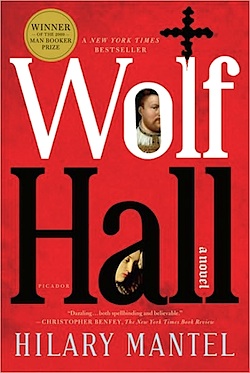Hilary Mantel’s Wolf Hall is a book that has been very successful—it’s a huge historical novel that won the Booker Prize. It has 240 reviews on Barnes and Noble’s website. It’s a bestseller. It needs no praise from me. But I haven’t heard much talk about it among fantasy readers, and so I thought it would be worth burbling about here a little.
All I want to say about it is that it’s brilliant, it’s compelling, and if you like Martin’s Song of Ice and Fire books and you’re not violently allergic to books set in real history you should rush out and read it. It’s the story of Thomas Cromwell, a blacksmith’s son from Putney who works his way up by skill, intrigue and cleverness to being one of Henry VIII’s closest counsellors and one of the most powerful men in Britain. The title comes from the name of the home of the Seymour family, Wolf Hall, but also from the aphorism that is the theme sentence of this novel “homo homini lupus,” “man is wolf to man.”
Tudor England is as strange and alien as any fantasy world or alien planet, and as fascinating. Thomas Cromwell has usually been cast as the villain of this story—he’s the villain in the movie A Man For All Seasons and I believe he’s a villain in the TV series The Tudors. It’s very interesting to see this world and these controversies from his point of view as he manipulates and plans for contingencies. “It’s all very well to have a plan for next year, but you also have to have a plan for tomorrow.” We have the fall of Cardinal Wolsey, Henry’s divorce, and the beginnings of the Reformation, all in the context of Cromwell’s own life and ambitions and hopes. It doesn’t matter whether you know quite a lot about the period or nothing at all, the book contexts itself and draws you through exactly like a fantasy novel. If you know more, it all connects on, if you don’t, it doesn’t matter.
Mantel doesn’t make the mistake historical novelists sometimes make of having too narrow a field. These are characters living in the consequences of earlier history, their own and the country’s. She also doesn’t limit herself to England—Cromwell’s experiences and connections in Florence and Antwerp and France are all part of the web. This is a big book in all senses, but I wish it were twice as big and I long for the sequel.
This is a book about sex, religion, intrigue, integrity, love and money, with well drawn characters and a great deal going on. I’ve read it twice now and been absolutely absorbed in it both times—I hardly put it down. As well as reminding me of Martin it also reminds me of Abraham’s The Dragon’s Path. The thing it does that neither of them do is the focus on one man—Cromwell’s a man of no birth in a world where everybody who is significant is supposed to be a noble. (“How is it you’re such a person?” the Duke of Norfolk asks him, bemused.) He’s aware of his birth and his natural and acquired skills and he’s not above wanting revenge. He’s also keen to elevate his family—and Oliver Cromwell was his great-great-great nephew, a hundred years later.
Anyway, if you want a fat novel to fall into and come out gasping and wondering what century and country you’re in, you’d be hard put to it to do better than Wolf Hall.
Jo Walton is a science fiction and fantasy writer. She’s published two poetry collections and nine novels, most recently Among Others, and if you liked this post you will like it. She reads a lot, and blogs about it here regularly. She comes from Wales but lives in Montreal where the food and books are more varied.










